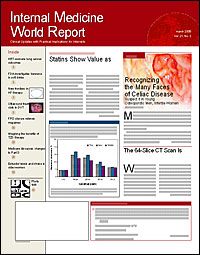WHI: Estrogen Protects Against Heart Disease in Younger Postmenopausal Women
Women who were part of the conjugated equine estrogen group of the Women's Health Initiative (WHI) and who were aged 50 to 59 years at study onset appear to have had a reduced risk for coronary heart disease (CHD), according to new 7-year subgroup analysis data published recently in the Archives of Internal Medicine (2006;166: 357-365). However, the study did not show that this type of estrogen offers any protection against CHD, including myocardial infarction (MI) or coronary death, in otherwise healthy postmeno?pausal women aged 50 to 79 years.
The well-known WHI study, which was prematurely ended after 6.8 years of follow-up in March 2003, was bifurcated into 2 groups: (1) those with an intact uterus who received both progestin and estrogen, and (2) those who had undergone a hysterectomy and who received only conjugated equine estrogen. These data reflect the final results from the 10,739 postmenopausal women (median age, 63.6 years) who were randomized to conjugated estrogen (0.625 mg/d) or placebo. The primary end point was MI or coronary death; secondary end points were coronary outcomes and subgroup analyses.
During the treatment period, a total of 201 coronary events were reported in women re?ceiving conjugated estrogen (n = 5310) and 217 events in those receiving placebo (n = 5429). Among women who were aged 50 to 59 years at study onset, 8 women taking estrogen had an MI or coronary death compared with 14 women taking ?placebo (hazard ratio, 0.60; 95% confidence interval, 0.25-1.44).
In addition, 13 women in the estrogen group had coronary events compared with 20 women in the placebo group. And fewer women in this age-group who were taking estrogen required coronary revascularization compared with those taking placebo. No significant differences were reported for secondary coronary outcome measures among women who were aged 60 to 69 or 70 to 79 years at study onset.
"[Estrogen] provided no overall coronary protection in women who had undergone prior hysterectomy, although there was a suggestion of lower CHD risk with CEE [conjugated equine estrogen] in women 50 to 59 years of age," lead investigator Judith Hsia, MD, of George Washington University, Washington, DC, and colleagues wrote.
They noted that although the data offered by the WHI may not be ideal, they are likely to "remain the basis for clinical decisions for the foreseeable future" due to the fact that the barriers to constructing a suitable trial to deal with the issues of safety and ?effectiveness in perimenopausal and early postmenopausal women are? ?"considerable."
